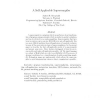1090 search results - page 69 / 218 » Type-Directed Partial Evaluation |
ISPD
2003
ACM
14 years 29 days ago
2003
ACM
Delay evaluation is always a crucial concern in the VLSI design and it becomes increasingly more critical in the nowadays deep-submicron technology. To obtain an accurate delay va...
CHI
2008
ACM
14 years 8 months ago
2008
ACM
We present a pair of experiments that explore the effects of tactile-feedback and direct vs. indirect pen input on pointing and crossing selection tasks. While previous work has d...
ICFP
1999
ACM
14 years 18 hour ago
1999
ACM
Functional logic languages combine the operational principles of the most important declarative programming paradigms, namely functional and logic programming. Inductively sequent...
DAGSTUHL
1996
13 years 9 months ago
1996
A supercompiler is a program which can performa deep transformation of programsusing a principle which is similarto partial evaluation, and can be referred to as metacomputation. ...
JAIR
2008
13 years 7 months ago
2008
Asynchronous Partial Overlay (APO) is a search algorithm that uses cooperative mediation to solve Distributed Constraint Satisfaction Problems (DisCSPs). The algorithm partitions ...

